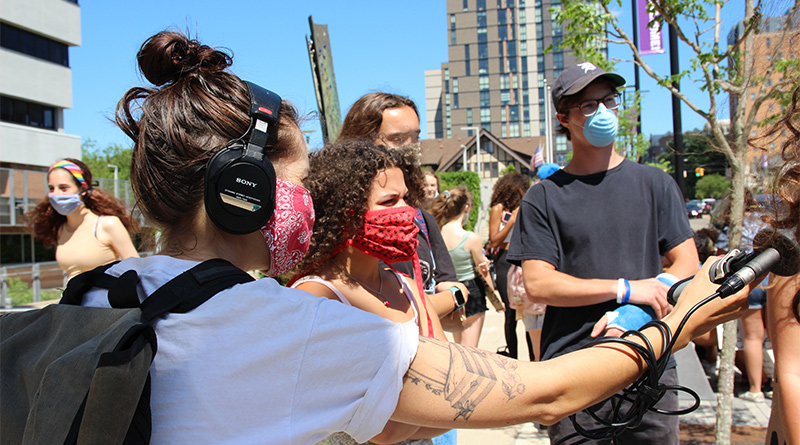What creating a podcast during the shutdown taught me

(Emma Winowiecki – Michigan Radio)
On March 11, rumors started flying that school was going to close by the end of the week. One of my classes had been planning a podcast in collaboration with Michigan Radio all year, and our plan was to start recording on Friday, March 13. I grew up watching “Friday the 13th” movies, so I should have known better than to ever plan anything on that date.
We had the name of our podcast, our logo, our tagline, and the episode topics, but we had no — as in zero — interviews recorded. We quickly found a supply closet and a teacher’s office (I work in an old school with no recording studio) where we would record as many interviews as we could before the closure. We spent three days in high-speed mode doing interviews. March 13 was indeed our last day, yet it was also just the beginning of our recording process. Our podcast had a drop deadline of May 20. It was a real deadline.
We actually got it done, but getting there took some doing. I’ve always believed in the power of journalism, but during the pandemic it became more; it was a lifeline that kept us all engaged and moving forward. Where some of my other classes were built on individual assignments and papers, our podcast class had a clear, collective purpose and a deadline. We were making something, and students stepped up to work overtime. As unideal as it sounds, creating a podcast during this time was, unexpectedly, exactly what we needed.
We had three recording kit bags that I would drive to and from my students. We had a routine: students would leave the kits outside, I would pick them up, clean them in my “sanitizing station” in the back of my car and bring them to the next student. I’ve never known where all of my students lived before, and driving around to their homes and waving, talking, smiling, and missing them from afar gave us much-needed, real-life contact. When I first took my advising job, the former adviser, who retired after 35 years of teaching, told me that he always did home visits to every single student, every single semester. Twenty-four years later, in the midst of the pandemic, I finally understood why he did them.
When I think back to past podcasts that my students have done, I realize that I was missing a teaching opportunity. I didn’t have the expertise nor the tools that I needed to guide them. There were critical pieces that were missing: planning, reporting, storytelling, writing, revision and editing. They were missing because I didn’t know how to teach them, and sometimes I didn’t even know that all of those pieces were an essential part of podcasting.
As I am planning for next year, podcasting is definitely part of it. I know that without this podcast experience working with Jennifer Guerra and Rachel Ishikawa, I wouldn’t have an idea about where to start. Jennifer was the Executive Producer of Michigan Radio’s Peabody Award-winning podcast, Believed, and a 2018 Knight-Wallace journalism fellow at the University of Michigan. Rachel helped produce WXPN and NPR Music’s award-winning The Gospel Roots of Soul in 2018-2019, and worked closely with youth in Philadelphia as the Social Practice Lab Artist-in-Residence at Asian Arts Initiative from 2016-2017. The two collaborated with us for the year, and I had the chance to learn alongside my students.
Jen and Rachel’s advice can give all of us the solid foundation that we need to get our students started with creating and building their own podcasts. We are sharing some key info with you: Tips on Audio Storytelling, Reporting Kits and discussion questions to get your students thinking about podcasts and engaging with issues.
At a time when we are missing human contact and hearing each other’s voices, podcasts can connect us. It’s the right time to dive in.




